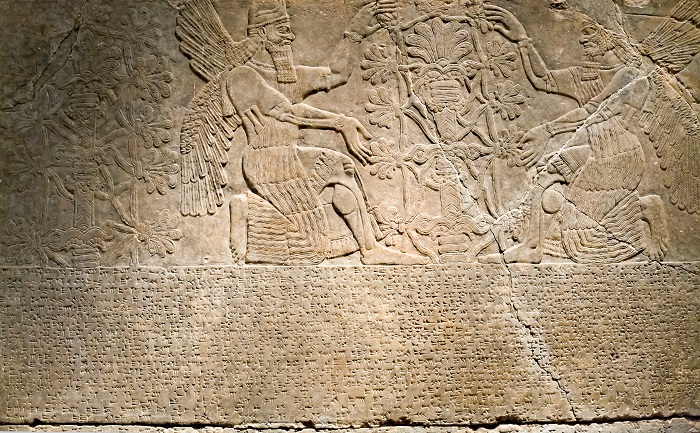arts online news
When Islamic State group fighters bulldozed the ancient monumental Mashki gate in the Iraqi city of Mosul in 2016, it was part of the extremists’ systematic destruction of cultural heritage. online news
Now, US and Iraqi archaeologists working to reconstruct the site have unearthed extraordinary 2,700-year-old rock carvings among the ruins.
They include eight finely made marble bas-relief carvings depicting war scenes from the rule of the Assyrian kings in the ancient city of Nineveh, a local Iraqi official said Wednesday.
Discovered last week, the detailed carvings show a soldier drawing back a bow in preparation to fire an arrow, as well as finely chiselled vine leaves and palms.
The grey stone carvings date to the rule of King Sennacherib, in power from 705-681 BC, according to a statement from the Iraqi Council of Antiquities and Heritage.
Sennacherib was responsible for expanding Nineveh as the Assyrians’ imperial capital and largest city — siting on a major crossroads between the Mediterranean and the Iranian plateau — including constructing a magnificent palace.
Fadel Mohammed Khodr, head of the Iraqi archaeological team working to restore the site, said the carvings were likely taken from Sennacherib’s palace and used as construction material for the gate.
“We believe that these carvings were moved from the palace of Sennacherib and reused by the grandson of the king, to renovate the gate of Mashki and to enlarge the guard room”, Khodr said.
- ‘Iconic’ –

When they were used in the gate, the area of the carvings poking out above ground was erased.
“Only the part buried underground has retained its carvings,” Khodr added.
ALIPH, the Swiss-based International Alliance for the Protection of Heritage in Conflict Areas, said the Mashki gate had been an “exceptional building”.
IS targeted the fortified gate, which had been restored in the 1970s, because it was an “iconic part of Mosul’s skyline, a symbol of the city’s long history”, it added.
arts online news
ALIPH is supporting the reconstruction of the Mashki Gate by a team of archaeologists from Iraq’s Mosul University alongside US experts from the University of Pennsylvania.
The restoration project, which is being carried out in collaboration with Iraqi antiquities authorities, aims to turn the damaged monument into an educational centre on Nineveh’s history.
Iraq was the birthplace of some of the world’s earliest cities.
It was also home to Sumerians and Babylonians, and to among humankind’s first examples of writing.
But in the past decades, Iraq has been the target of artifacts smuggling. Looters decimated the country’s ancient past, including after the 2003 US-led invasion.
Then, from 2014 and 2017, the Islamic State group demolished pre-Islamic treasures with bulldozers, pickaxes and explosives. They also used smuggling to finance their operations.
Iraqi forces supported by an international coalition recaptured Mosul, the extremists’ former bastion, in 2017.
str-tgg/pjm/lg
© Agence France-Presse. All rights are reserved.
arts online news
Notes from APS Radio News
For a number of years critics of US foreign policy have maintained that the US and other Western countries like the UK and France have been funding and providing military support to Islamist groups and militants.
During the Civil War in Syria, many said that the US, France, the UK and Qatar had been funding and supporting various terrorist groups who were seeking to topple the government in that country.
To March of this year, over 600,000 people have died in Syria’s civil war.
Millions more were displaced.
During the Obama administration, in 2011, not long after the Civil War had started, a State Department spokesperson acknowledged that the US had been spending millions of dollars to support opposition groups.
The same type of policy was followed in Libya’s Civil War, which happened during the same period in 2011.
Islamist groups participated in the overthrow of the secular but authoritarian government in that country.
Just as the government was overcoming a number of rebel groups, the UN imposed a no-fly zone, even as NATO airstrikes were taking place.
Later that year, Muamar Qaddafi, the former head of state, was executed by rebels.
After hearing of the execution, the then Secretary of State, Hillary Clinton, said, “We came. We saw. He died”. After uttering those words, she laughed.
Ms. Clinton was one of the administration’s most vocal supporters of the overthrow of Syria’s leader, President Assad, and the overthrow of the Qaddafi regime.
Following the latter’s overthrow and the destruction of major parts of Libya’s infrastructure, rebel groups were able to take over large parts of the country.
Beheadings and sharia law were imposed in various parts of Libya.
arts online news


